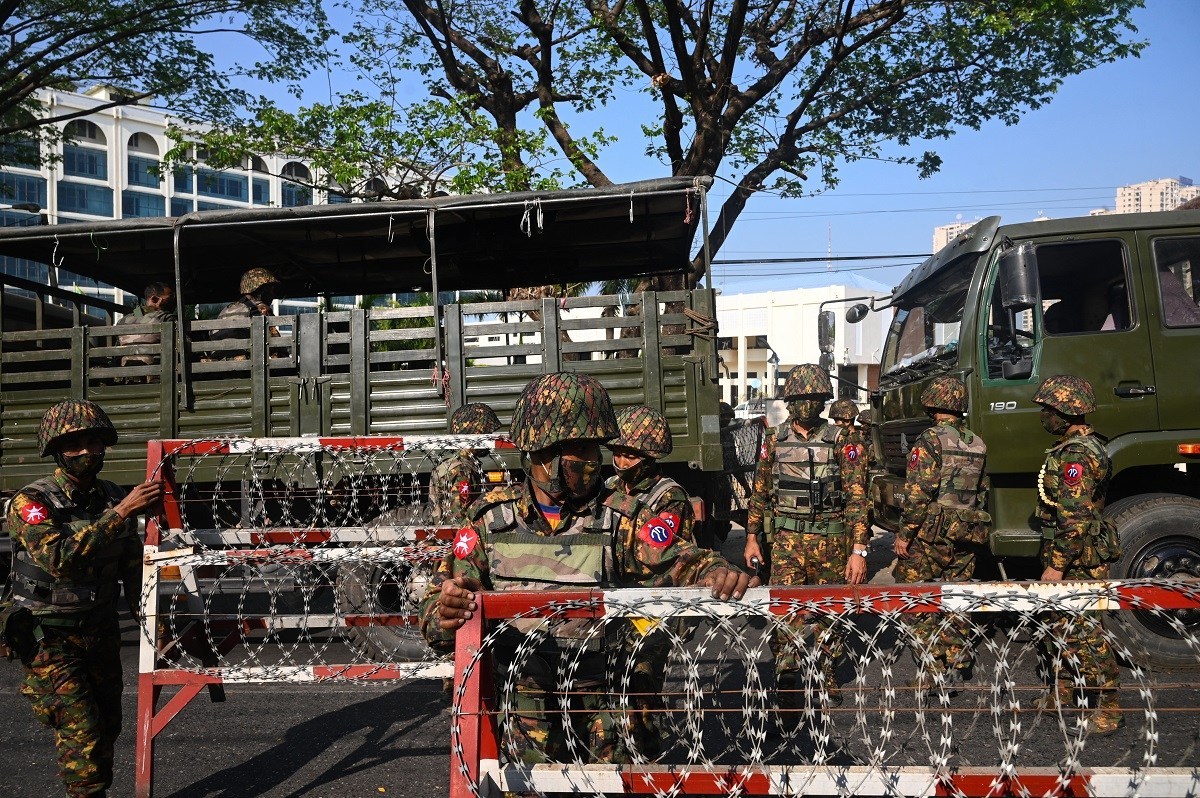[ad_1]
As the effects of the Myanmar coup continue to unfold, countries throughout Southeast Asia are bracing for the regional fallout. The coup was the first military takeover the politically unstable nation had experienced in a generation.
Beginning on February 1, Myanmar’s military started seizing the reins of power. The military, under the leadership of Senior General Min Aung Hlaing, had earlier declared the elections held in November null and void. The coup was in essence executed to prevent the new government from formally taking shape.
First, troops detained newly elected chief executive Aung San Suu Kyi, the longtime democracy advocate who spent years under the persecution of the military junta that ruled Myanmar for two decades between 1990 and 2011. The following day, the military established the State Administration Council, with 11 members, as the executive governing body.
Several other democratically elected officials, including the head of state, President Win Myint, have also been arrested. General Hlaing has already begun appointing new officials to replace them.  Â
Suu Kyi is no stranger to the military intervening in her political status. The most recent time she clashed with top defense brass was in 2015 when her party, the National League for Democracy, won a landslide in the national election. The military, however, which had been administering a caretaker government up to that point, retained substantial power, including the right to appoint a quarter of the country’s parliament.
Despite these shaky beginnings and a less-than-smooth five years in office, the recent period was seen by many in Myanmar and abroad as the emergence of a stable democracy. Last month’s coup, however, has completely reshaped the country’s political landscape.
The unstable situation in Myanmar is still ongoing. Suu Kyi has been forced to appear in court on charges recognized by the international community as spurious or outright manufactured. Large portions of the country remain under martial law, gatherings have been banned, and a nightly curfew impacts the vast majority of citizens.
But in addition to the fate of Myanmar’s citizenry, what stands in the balance is the future of the Southeast Asia region.
Already the transnational consequences of the coup are beginning to show themselves. The undermining of democracy is deterring foreign involvement in the country. Days after the coup began, for instance, the Japanese conglomerate Kirin Holdings announced it would be terminating its two joint ventures in Myanmar.
The Japanese company holds the majority stakes in Myanmar Brewery and Mandalay Brewery, which is co-owned with Myanmar Economic Holdings Ltd (MEHL), an entity that serves as a welfare fund for the military.
The military’s actions were “against our standards and human rights policy,†Kirin said in a statement on Friday. “We have no option but to terminate our current joint-venture partnership.â€
Similarly, many observers have projected further decline of the Myanmar economy because of restrictions on civil liberties imposed by the military as well the general ineptitude of the junta to manage monetary and market policy.Â
The coup may also trigger responses from regional powers as well as disagreements among stakeholders.
While Myanmar has relatively marginal importance vis-à -vis US foreign policy, Washington may feel compelled to enact sanctions against military leaders and some of the country’s bigger business entities. So far, President Joe Biden’s administration has indicated it takes a very dim view of the coup and has unleashed fresh sanctions against Min Aung Hlaing and his top lieutenants.
Countries closer to the scene such as China and India (both of which hold significant clout with Myanmar’s military leadership) may also take action to oppose the new military regime.
Other neighboring nations such as Singapore and Indonesia have also reacted by taking a stand against the violence perpetrated against protesters in Myanmar, although many are seeking to maintain communications with the new rulers. Singapore, for instance, which kept ties with the former ruling junta from the 1990s until Myanmar’s opening up in 2010, has gone on record warning that widespread sanctions would have a devastating effect on Myanmar’s population.Â
Last are the implications the coup will have on the standing of international law in the region and perhaps even beyond. Currently, there are two legal proceedings before international courts pertaining to Myanmar.
The first is the International Criminal Court’s case regarding the waves of violence in Myanmar’s Rakhine state that occurred in 2016 and 2017. The second is the International Court of Justice case in relation to the application of the Genocide Convention, brought by the government of The Gambia in the wake of the Rohingya crisis of 2015.
Each of these legal processes has its own challenges and the repercussions of the events in Myanmar may be slightly different for each. But overall, the coup and the subsequent dislocation of the entire rank and file of Myanmar’s leadership could lead to impunity for those behind the alleged crimes.
This, in turn, would create an incentive for other suspected international-law violators, both in the region and around the globe, to usurp governmental power to avoid prosecution.
The situation in Myanmar remains in flux and the military is still struggling to impose absolute control. One thing is certain, this sudden upheaval in Myanmar politics will have lasting implications, implications that will likely extend far beyond the country’s borders. Â
[ad_2]
Source link











